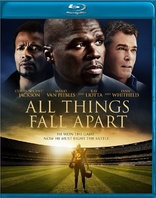All Things Fall Apart Blu-ray Movie
HomeAll Things Fall Apart Blu-ray Movie 
Image Entertainment | 2011 | 110 min | Rated R | Feb 14, 2012Movie rating
5.8 | / 10 |
Blu-ray rating
| Users | 4.0 | |
| Reviewer | 3.5 | |
| Overall | 3.5 |
Overview
All Things Fall Apart (2011)
A drama centered on a promising football running back during his senior year in college.
Starring: Curtis Jackson, Mario Van Peebles, Lynn Whitfield, Ray Liotta, Ambyr ChildersDirector: Mario Van Peebles
| Drama | Uncertain |
| Sport | Uncertain |
Specifications
Video
Video codec: MPEG-4 AVC
Video resolution: 1080p
Aspect ratio: 1.78:1
Original aspect ratio: 1.85:1
Audio
English: DTS-HD Master Audio 5.1
Subtitles
English SDH, Spanish
Discs
25GB Blu-ray Disc
Single disc (1 BD)
Playback
Region A (C untested)
Review
Rating summary
| Movie | 3.0 | |
| Video | 4.5 | |
| Audio | 4.0 | |
| Extras | 0.5 | |
| Overall | 3.5 |
All Things Fall Apart Blu-ray Movie Review
Those Left Behind
Reviewed by Michael Reuben February 12, 2012Looking solely at the credits for All Things Fall Apart (hereafter "ATFA"), one could easily be pardoned for seeing a vanity star vehicle for rapper Curtis "50 Cent" Jackson, who plays the lead, wrote the story, co-scripted, co-produced and contributed substantially to the soundtrack. (Mario Van Peebles directed.) That's certainly what my colleague Brian Orndorf saw, who, as of this moment, is the only movie reviewer with a rating at Rotten Tomatoes. And that fact alone is striking. What kind of "star vehicle" receives so little promotion that there's only one review on the eve of its theatrical release? For that matter, what kind of "star vehicle" is handled not by a major studio, not even by a secondary operation like Starz, Lionsgate or Summit, but through Image Entertainment, the venerable video distributor that only occasionally dips its toe into theatrical exhibition? And what kind of "star vehicle" goes to cable TV first, then gets a limited theatrical release day and date with its release on Blu-ray and DVD? I agree with Brian that ATFA is flawed, and I also agree that Jackson's range as an actor is limited (which isn't necessarily a fatal flaw, by the way; under the old studio system, many a successful acting career was built on limited range). But I disagree that the film itself, while constructed of familiar elements, is a "hackneyed, stilted production . . . crying out for just a smidge of invention that would enliven the story". Indeed, my colleague himself identifies one such "smidge" later in his review when discussing the subplot in which Jackson's character, Deon, steals the girl on whom his younger brother has a crush, thereby revealing Deon to be "utterly heartless". Yes, that's right. Jackson's supposedly tragic "hero" is, in fact, a spoiled, self-centered jock, whose every whim is indulged, and the film doesn't stint on showing his unattractive qualities before knocking him flat on his ass. What my colleague found "baffling", I found interesting—maybe not exactly "inventive" (jocks with a sense of entitlement being a stock figure in American culture), but an instant source of conflict with intriguing dramatic potental. There's a lot crammed into ATFA, and it's too much. The film's main failing is an inability to harmonize its disparate themes into a unified chorus. As a result, both the script and the director have to "force" moments that should arise naturally from the story and the material, but that doesn't make the movie dull or the effort worthless. The themes are still important, especially for the youthful audience most likely to turn out for a movie featuring Curtis Jackson.
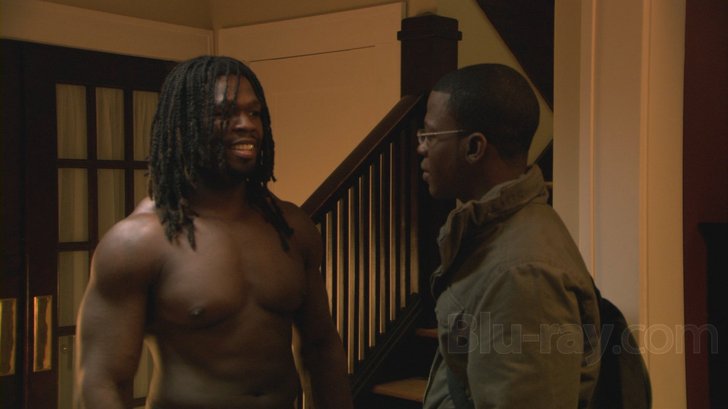
Jackson reportedly based the story of ATFA on the experience of a friend, which may be part of the problem right there. If a writer is too close to a story, it's easy to lose objectivity. Whatever the reason, there are three interweaving plot lines running through the film, and although they're obviously connected, as a viewer you often feel like you're being bounced among different movies. First, there's the family story of Deon Barnes (Jackson), a star running back in his senior year of a football scholarship at an unnamed university in the Midwest (probably Michigan, where exteriors where shot); his younger brother, Sean (Cedric Sanders), also a student at the same school, who has lived in Deon's shadow his whole life; their mother, Bee (Lynn Whitfield), who owns a bar and runs a catering service; and their stepfather, Eric (Van Peebles), who owns a car repair shop. The entire family dynamic has been skewed by Bee's obvious preference for her first-born and her hopes (and later, Eric's) for the advantages that Deon's natural athletic prowess can bring to the family. In scene after scene, ATFA shows the problematic repercussions that flow from the peculiar bubble in which Deon's family have isolated him, with the complicity of his coach, teammates and school authorities: a bubble reserved for the very few, where enormous pressures are applied for some things (because so many others are resting their hopes and dreams and frustrations on one young man) and other pressures are removed entirely (because no one cares whether he attends class, gets decent grades or treats any woman with respect other than his mother). The toll on Deon's brother, Sean, who happens to be very smart, works just as hard, and probably has better long-term prospects than a football player, is especially heavy. The second plot line is the struggle for a family like the Barnes to maintain a hold on a middle class existence in modern America. The economy is poor, jobs are scarce and the future is uncertain. The professor in Sean's economics class (Hugh Maguire) talks to his students about China, "green jobs" and skills for the next wave of development. Eric, whose own football career never took off, counsels Deon to have something to fall back on, but he doesn't, and neither does the family. They've staked everything on Deon's success as a professional athlete, but that prospect vanishes with Deon's cancer diagnosis. Like far too many people in America, their life plan was a long shot, a lotto ticket, a brass ring that everyone thinks they can grasp and almost no one actually does. When the dream vanishes, the family awakens to find itself deeply in debt. The third plot line is timely and critical: the impact of catastrophic illness on the typical American household, including physical, financial and psychic tolls. That the illness depicted in the film is cancer, as opposed to a sports-related injury, is appropriate, because the statistics are inescapable: Cancer, in one of its many varieties, is a disease that every American who will see the film (or is reading these words) will almost certainly encounter at some point in his or her life, either personally or through a close friend or family member. When it happens to you (if it hasn't already), you will make the acquaintance of the treatment industry represented by Dr. Brintall (Ray Liotta) in ATFA, along with various supporting players. Now, I'm sufficiently familiar with this industry to pronounce the film's depiction of it as accurate, but I also disagree with my colleague's characterization of the industry as "vampiric". Nor does Dr. Brintall anywhere admit that he "bleeds patients dry of their insurance money". (I double-checked the dialogue.) What the film shows is a health care system with a protocol for treating cancer that's the best thing we have (and isn't that great). You're diagnosed, you're offered the treatment, and if you say go ahead (which almost everyone does), the protocol kicks in. The film depicts the consequences from the patient's side, much as Mike Nichols and Emma Thompson did in their 2001 film of Wit (based on the Pulitizer Prize-winning play), with the key difference being that Bee and Eric are self-employed, which means they have to foot the bills directly. Every one of these plot lines could have filled a film on its own, but ATFA stresses each so heavily at alternate points that it leaves itself with the impossible task of bringing all of them to a satisfying resolution. The burden falls on the actor playing Deon, and it's an impossible task that would have defeated even a young Marlon Brando. Leave aside the ability to act it; who could devise a convincing narrative that allows Deon to reconcile with his brother and heal his family, fix their financial future, say goodbye to his old life and embrace whatever the future holds—all in the third act of a two-hour film? You'd need a miniseries (at least). So we're stuck with the ending we have, which I won't try to describe other than to say that it plays like a dream sequence, because it's so at odds with the film's otherwise realistic texture. Elsewhere I've discussed Mario Van Peebles' career as a director, and ATFA's lack of focus is surprising from a filmmaker whose previous work has never lacked for focus. But as revealed in an intriguing interview posted by Blu-ray.com's Josh Katz, Van Peebles was initially recruited to the project solely as an actor and only later persuaded to helm the project as a director-for-hire. His chief task seems to have been coaching Jackson's performance as Deon. Still, ATFA's sense of a larger economic context is oddly reminiscent of the critique of Reaganomics that Van Peebles managed to evoke in New Jack City, and it's entirely possible that Van Peebles' involvement actually contributed to the film's sense of being overstuffed, especially once they got into the editing room. Ultimately, though, I'm more engaged by filmmakers who try to deal with important subjects and fail than those who repeat the same slick formulas of guns, drugs and get rich or die trying. I don't know whether Curtis Jackson will ever find his footing as a movie star, but I like the territory he's exploring.
All Things Fall Apart Blu-ray Movie, Video Quality 

According to the website for cinematographer Matthew Irving (with thanks to a helpful reader for the link), All Things Fall Apart was shot digitally on Red One and Canon 5D Mark II cameras. As per the film's credits, color timing was finished on a digital intermediate, which was almost certainly the source for the 1080p, AVC-encoded Blu-ray, thereby ensuring an accurate translation. The image is clean and detailed with a generally realistic color palette, except for the occasional flashback, which is desaturated to indicate action set in the past and remembered. Blacks are deep, and contrast is strong without being excessive. There is no indication of high-frequency filtering or artificial sharpening, and no compression errors were observed. Whatever fault one may find with the film itself, its presentation on Blu-ray is above reproach.
All Things Fall Apart Blu-ray Movie, Audio Quality 
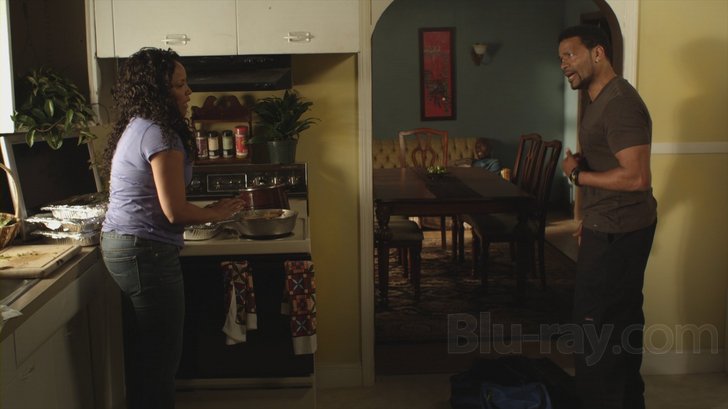
Van Peebles has gone for aggressive soundtracks even when he was limited to stereo by either technical or budgetary considerations, as in New Jack City or Posse. The family drama of All Things Fall Apart doesn't present as many opportunities for sonic flash, but Van Peebles does seize upon the few football scenes and a big party to have some fun with the possibilities of a discrete 5.1 format. The opening sequence, which is a flashback to a pee-wee league childhood game involving Deon and Sean, with Mama Bee cheering from the bleachers and other parents and fans all around, is a classic demonstration of enveloping sound design, ably presented in DTS-HD MA, with claps, whoops and cheers issuing from around the room. Similar, but bigger, effects are apparent in the two big games where we see Deon perform before illness takes him down. Environmental ambiance is present throughout, dialogue is as clear as it needs to be (some of the exchanges are deliberately muttered), and the score by Tree Adams (Californication) is effectively reproduced.
All Things Fall Apart Blu-ray Movie, Special Features and Extras 
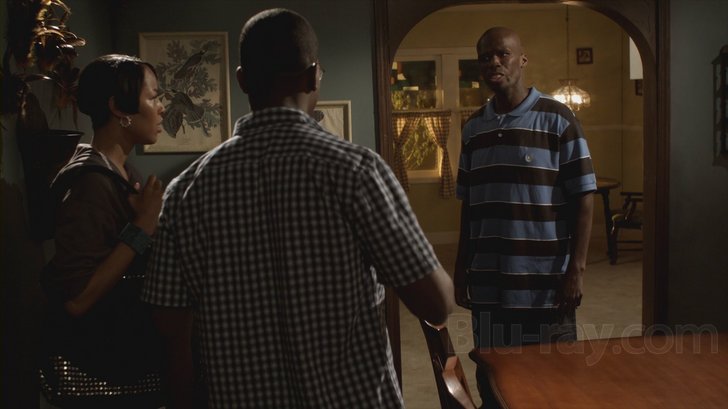
- Trailer (SD; 1.78:1, enhanced; 1:51): A reasonably accurate preview (for a change).
All Things Fall Apart Blu-ray Movie, Overall Score and Recommendation 
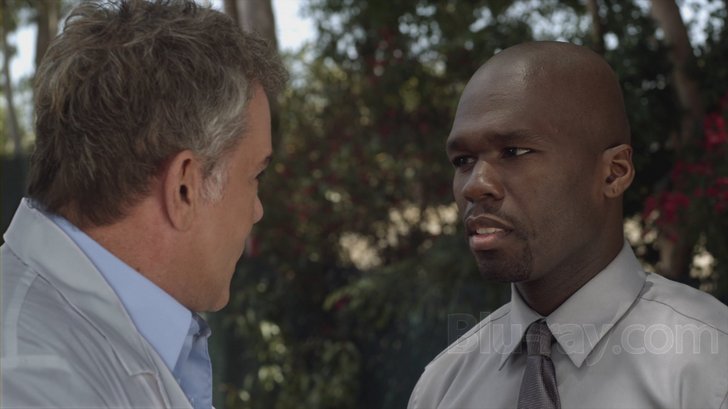
All Things Fall Apart is flawed, but I'd rather watch the flawed result of serious intentions than the latest slick exercise in studio marketing. One might wish that Jackson had limited himself to writing, producing and musical duties and let another actor play Deon: someone more expressive, more dynamic and maybe more age-appropriate. Then again, could the movie have been made at all without Jackson in the lead? Considering the low-profile release, one suspects that it took Jackson's full participation to sell this story, of which the lesson (if you insist on distilling one) is that one's fortunes in life often rest on something as tiny as a quirk of cellular replication. Best to keep every option open and treat everyone decently, because you never know who or what you may need when you're down. That's a hard lesson to put into practice, but it's better to start learning it in the safety of a movie or home theater than when you're standing opposite a real doctor like Ray Liotta's Brintall, and he's delivering the bad news before rushing off to the next patient/customer. Recommended, with appropriate caveats.
Similar titles
Similar titles you might also like

The Damned United
2009

Rudo y Cursi
2008

The 5th Quarter
Special Edition
2010

The Wrestler
2008

Invictus
2009

He Got Game
1998

Any Given Sunday
15th Anniversary Edition | Director's Cut | Includes Theatrical Cut DVD
1999

Luck: The Complete First Season
2011-2012

Million Dollar Baby
10th Anniversary Edition
2004

Grand Prix
1966

The Color of Money
25th Anniversary Edition
1986

Bang the Drum Slowly 4K
Standard Edition
1973

Sugar
2008

Run the Race
2019

The Express
2008

Phantom Punch
2009

Raging Bull 4K
1980

Fat City
Limited Edition to 3000
1972

Underdog
2019

Nil by Mouth
1997
